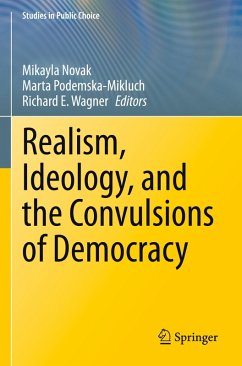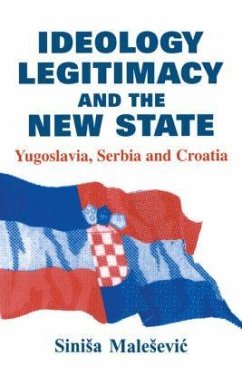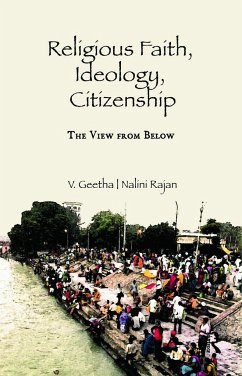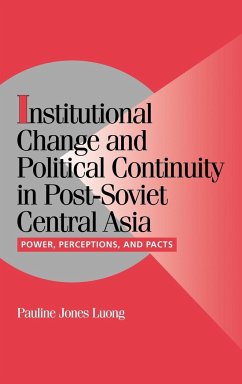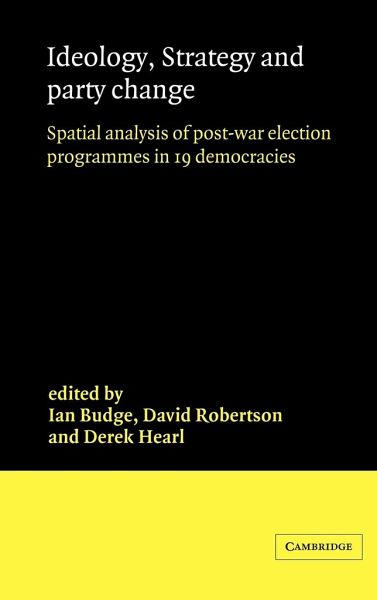
Ideology, Strategy and Party Change
Spatial Analyses of Post-War Election Programmes in 19 Democracies
Herausgeber: Budge, Ian; Hearl, Derek; Robertson, David

PAYBACK Punkte
71 °P sammeln!
The relevance of this book to central concerns of political and social science hardly needs emphasizing. Parties are the organizing force of democratic governments, giving coherence and direction to their policies and relating them to popular preferences. Election programmes are crucial to this role, providing electors with some insight into the policies they are voting for, and parties themselves with a starting point for their activity in government. Discussion begins with a comparative assessment of the impact of election pledges on government action. The book goes on to describe systematic...
The relevance of this book to central concerns of political and social science hardly needs emphasizing. Parties are the organizing force of democratic governments, giving coherence and direction to their policies and relating them to popular preferences. Election programmes are crucial to this role, providing electors with some insight into the policies they are voting for, and parties themselves with a starting point for their activity in government. Discussion begins with a comparative assessment of the impact of election pledges on government action. The book goes on to describe systematically the place of the programmes in the political process of nineteen democracies. It subjects them to detailed qualitative, quantitative and spatial analyses to answer such questions as: Who prepares election programmes and how? What is the nature of modern party divisions? Do they differ across countries? Is there indeed an 'end of ideology' or an intensification? Does the need to attract votes weaken old partisan attachments? Combining individual studies of each country with comparative analyses on a scale never previously undertaken, the book will interest country specialists and comparativists and prove indispensable to research on voting and party behaviour, coalition formation, ideology, and rational choice.
Table of contents:
1. Influence of election programmes: Britain and Canada 1945-1979 Colin Rallings; 2. The internal analysis of election programmes Ian Budge; 3. Britain, Australia, New Zealand and the United States 1946-1981, an initial comparative analysis David Robertson; 4. Canada 1945-1980: party platforms and campaign strategies William P. Irvine; 5. Sri Lanka 1947-1977: elite programmes and mass politics Judith Bara; 6. Israel 1949-1981 Judith Bara; 7. Ireland 1948-1981: issues, parties, strategies Peter Mair; 8. Northern Ireland 1921-1973: party manifestos and platforms Michael Laver; 9. Sweden and Denmark 1945-1982: election programmes in the Scandinavian setting Margareta Holmstedt and Tove-Lise Schou; 10. The Netherlands 1946-81 Karl Dittrich; 11. Belgium 1946-1981 Derek J. Hearl; 12. Luxembourg 1945-1982: dimensions and strategies Derek J. Hearl; 13. Austria 1945-1978 Franz Horner; 14. Electoral programmes in West Germany 1949-1980: explorations in the nature of political controversy Hans-Dieter Klingemann; 15. France 1958-1981: the strategy of joint government platforms François Pétry; 16. Italy 1946-1979: ideological distances and party movements Alfio Mastropaolo; 17. Japan 1960-1980: party programmes in elections Takashi Inoguchi; 18. Do parties differ, and how? Comparative discriminant and factor analyses Ian Budge and David Robertson; Appendices; General bibliography.
The relevance of this book to central concerns of political and social science hardly needs emphasizing. Discussion begins with a comparative assessment of the impact of election pledges on government action. The book goes on to describe systematically the place of the programmes in the political process of nineteen democracies.
A comparative assessment of the impact of election pledges on government action.
Table of contents:
1. Influence of election programmes: Britain and Canada 1945-1979 Colin Rallings; 2. The internal analysis of election programmes Ian Budge; 3. Britain, Australia, New Zealand and the United States 1946-1981, an initial comparative analysis David Robertson; 4. Canada 1945-1980: party platforms and campaign strategies William P. Irvine; 5. Sri Lanka 1947-1977: elite programmes and mass politics Judith Bara; 6. Israel 1949-1981 Judith Bara; 7. Ireland 1948-1981: issues, parties, strategies Peter Mair; 8. Northern Ireland 1921-1973: party manifestos and platforms Michael Laver; 9. Sweden and Denmark 1945-1982: election programmes in the Scandinavian setting Margareta Holmstedt and Tove-Lise Schou; 10. The Netherlands 1946-81 Karl Dittrich; 11. Belgium 1946-1981 Derek J. Hearl; 12. Luxembourg 1945-1982: dimensions and strategies Derek J. Hearl; 13. Austria 1945-1978 Franz Horner; 14. Electoral programmes in West Germany 1949-1980: explorations in the nature of political controversy Hans-Dieter Klingemann; 15. France 1958-1981: the strategy of joint government platforms François Pétry; 16. Italy 1946-1979: ideological distances and party movements Alfio Mastropaolo; 17. Japan 1960-1980: party programmes in elections Takashi Inoguchi; 18. Do parties differ, and how? Comparative discriminant and factor analyses Ian Budge and David Robertson; Appendices; General bibliography.
The relevance of this book to central concerns of political and social science hardly needs emphasizing. Discussion begins with a comparative assessment of the impact of election pledges on government action. The book goes on to describe systematically the place of the programmes in the political process of nineteen democracies.
A comparative assessment of the impact of election pledges on government action.






